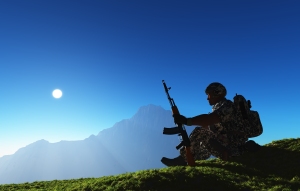
Not Politics, But Truth
Listen to Podcast of Blog Entry:
In the January 23, 2016 New York Times, an op-ed appeared entitled “Sarah Palin, This Is What PTSD Is Really Like.” While I do my best to avoid the political in this blog, the old truth remains: the personal is political. And the political is personal. Because of the piece’s context, I cannot help but speak politically. But because of its truth, I can admire it so much the more for the personal, for the person behind it, for the persons who live it daily.
Nathan Bethea served in the United States Army as an infantry officer for seven years, including a deployment to Afghanistan from 2009 to 2010. As best as I can extrapolate from the op-ed piece, he must have been stationed in Alaska during Mrs. Palin’s run as a vice-presidential candidate for the 2008 United States presidential elections—and her then-term as governor of the state.
Mr. Bethea appears to be no grand fan of Mrs. Palin. I must say that I join him in less-than-enthusiastic appraisal of her. But for him—and for me—she’s more a foil, a bearer of ideas far-too-widely spread among civilians, ideas that Mr.Bethea confronts with quiet bravery and quiet conviction.
He wrote his piece in response to Mrs. Palin’s linkage of her son Track’s recent arrest for domestic violence with his experiences both in and after combat since having served in the United States Army.
I will let Mr. Bethea speak for himself:
“Mrs. Palin seemed to suggest that the policies of President Obama had somehow worsened her son’s condition. And by explaining away domestic violence as the “ramifications of PTSD,” she intimated that her son’s actions are logical consequences of what he experienced while deployed. This is, of course, a disingenuous argument from a career opportunist. However, in a roundabout way, Mrs. Palin reignited a valuable discussion of combat and its psychological effects. Her portrayal of her son’s condition seems aligned with enduring renditions of veterans as ticking time bombs, as damaged beings primed to harm.”
He then wrote:
“Within a week of my return in March 2010…I found myself in a hot, loud and crowded room full of aloof young strangers. In that moment, I felt a sudden burst of panic, something completely unexpected. I felt as if I was going to die. I had to leave the room, to return to the safety of my truck parked outside in the snow. Something was very wrong; something about me was clearly defective.”
Then:
“Later, I realized that many of my friends had experienced similar moments: extreme reactions to emotional stimuli, hours of fear, weeks of hyper-vigilance. The common thread was not a tendency toward violence but rather toward self-hate. There were no flashbacks of combat. There was instead a sinking feeling that I’d always be a downer, always on guard, never able to relax. It was the fear of being permanently broken.”
Mr. Bethea was both fortunate and brave: fortunate in that he was able to access adequate treatment and support for his challenges, brave in that he was and is willing to accept both in order to make his post-combat life as meaningful as possible, currently, among others, as a writing instructor for the New York City-based creative arts program, Voices from War. He confronted stigma while in the Army. He confronts possible stigma right now as he contemplates his literary career.
And he’s a combat vet. He has what it takes to do what needs to be done. He seeks out missions, connections, strives for them, lives for them. He’s even willing to sign his name to them, in one of the most high-profile media outlets in the world.
That’s both a political choice and a choice beyond the political, utterly personal, yet so bravely public. Whether or not one agrees with his words, one has to admire that he, like so many other war writers, is not willing to let War have the last word. Not by a long shot.
He ends his piece this way:
“I can function in society because I was able to seek care, and I want to make that care more accessible to people who need it.
“That process begins by speaking frankly. Facing up to destructive or abusive behavior comes next, along with the assertion that we are responsible for our actions, no matter what burdens we carry. Post-traumatic stress is no excuse for violence or abuse, nor should it be considered a default association. I’d like to hope that, beneath the bluster and the political talking points, Sarah Palin understands this. I hope even more that her son seeks care and finds peace.”
What more can an old, civilian psychiatrist say except this:
Mr Bethea, Mr. Palin: may you both never forget who you have been. May you both never give up on who you might become. May I and my colleagues never fail you. May you both find peace, now and always.
Until tomorrow, be well,
Doc
To learn more about Voices from War